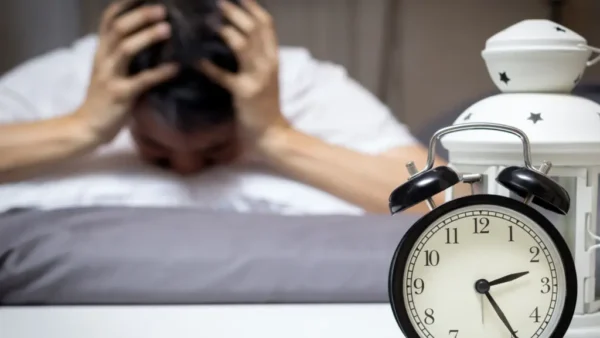- Understanding Insomnia During Detox
- The Connection Between Detox and Insomnia
- Symptoms of Insomnia During Detox
- Practical Strategies for Dealing with Insomnia During Detox
- Establishing a Sleep Routine
- Creating a Restful Environment
- Managing Stress and Anxiety
- Limiting Stimulants
- Incorporating Physical Activity
- Using Natural Sleep Aids
- Holistic Approaches to Improve Sleep During Detox
- Practicing Good Sleep Hygiene
- Cognitive Behavioral Therapy for Insomnia (CBT-I)
- Seeking Professional Help
- Leveraging Support Systems
- Exploring Herbal Remedies
- Long-Term Solutions for Insomnia Post-Detox
- Maintaining Healthy Sleep Habits
- Monitoring Your Progress
- Staying Committed to Overall Health
- Integrating Relaxation Techniques
- Adopting a Balanced Diet
- Hydration and Sleep
- The Psychological Aspect of Insomnia During Detox
- Understanding Your Emotional State
- Journaling
- Therapy and Counseling
- The Role of Technology in Managing Insomnia
- Sleep Tracking Apps
- Meditation Apps
- Blue Light Filters
- Developing a Comprehensive Plan for Better Sleep
- Personalized Sleep Plan
- Regular Review and Adjustment
- Support from Loved Ones
- Conclusion
Detoxing your body can be a challenging process, bringing both physical and emotional hurdles. Among these, insomnia is one of the most persistent and troubling issues many face. Learning how to deal with insomnia during detox can significantly improve your overall detox experience, helping you stay committed to your health goals while ensuring your body gets the rest it needs.
Understanding Insomnia During Detox
Insomnia, the inability to fall asleep or stay asleep, is common during detoxification. As your body adjusts to the absence of substances it is dependent on, withdrawal symptoms like insomnia can manifest. Understanding how to deal with insomnia during this period is crucial, as sleep plays a vital role in healing and recovery.
The Connection Between Detox and Insomnia
During detox, your body undergoes significant changes. Toxins are flushed out, and your systems start functioning without the substances they were reliant on. This can disrupt your normal sleep patterns, leading to insomnia. Knowing how to deal with insomnia can help you navigate this challenging phase more smoothly.
Symptoms of Insomnia During Detox
Recognizing the symptoms is the first step in understanding how to deal with insomnia. Common signs include difficulty falling asleep, waking up frequently during the night, and feeling unrested even after a full night’s sleep. These symptoms can exacerbate the discomfort of detox, making it even more important to address them effectively.
Practical Strategies for Dealing with Insomnia During Detox
Establishing a Sleep Routine
One effective method for how to deal with insomnia during detox is establishing a consistent sleep routine. Going to bed and waking up at the same time every day helps regulate your internal clock. Over time, this consistency can improve your sleep quality, even during the turbulence of detox.
Creating a Restful Environment
Your sleep environment plays a significant role in how to deal with insomnia. Ensure your bedroom is dark, quiet, and cool. Investing in a comfortable mattress and pillows can also make a big difference. Eliminating electronic devices that emit blue light can further enhance your ability to fall asleep and stay asleep.
Managing Stress and Anxiety
Detoxing can be a stressful process, and stress is a common trigger for insomnia. Learning how to deal with insomnia involves managing your stress and anxiety effectively. Techniques such as deep breathing exercises, meditation, and mindfulness can help calm your mind, making it easier to drift off to sleep.
Limiting Stimulants
Caffeine and nicotine are stimulants that can interfere with your sleep. During detox, it’s especially important to limit or avoid these substances. Understanding how to deal with insomnia means recognizing the impact of what you consume. Opt for herbal teas or other caffeine-free beverages to support better sleep.
Incorporating Physical Activity
Regular physical activity is a natural way to enhance your sleep quality. Exercise helps regulate your circadian rhythm and reduce stress levels. For those learning how to deal with insomnia, incorporating activities like walking, yoga, or gentle stretching can be particularly beneficial. However, avoid vigorous exercise close to bedtime as it may have the opposite effect.
Using Natural Sleep Aids
Natural sleep aids can be a gentle way to assist in how to deal with insomnia. Melatonin supplements, valerian root, and chamomile tea are popular choices. Always consult with a healthcare professional before starting any new supplement, especially during detox, to ensure it’s safe for your specific situation.
Holistic Approaches to Improve Sleep During Detox
Practicing Good Sleep Hygiene
Good sleep hygiene is fundamental to how to deal with insomnia. This includes maintaining a regular sleep schedule, creating a relaxing pre-sleep routine, and ensuring your sleep environment is conducive to rest. Avoiding heavy meals and excessive fluids before bedtime can also help prevent sleep disturbances.
Cognitive Behavioral Therapy for Insomnia (CBT-I)
CBT-I is a structured program that helps individuals understand and change thoughts and behaviors that affect their sleep. For those exploring how to deal with insomnia, CBT-I can be particularly effective, offering long-term solutions beyond the detox period. This therapy is typically conducted by a trained therapist and involves several sessions.
Seeking Professional Help
If insomnia persists despite trying various strategies, it may be time to seek professional help. A healthcare provider can offer personalized advice and may recommend medication if necessary. Understanding how to deal with insomnia sometimes requires medical intervention, especially if it severely impacts your daily functioning.
Leveraging Support Systems
Support from friends, family, or support groups can be invaluable when learning how to deal with insomnia. Sharing your experiences and challenges with others who understand what you’re going through can provide comfort and practical advice. Don’t hesitate to reach out for support when needed.
Exploring Herbal Remedies
Herbal remedies have been used for centuries to promote relaxation and sleep. In addition to melatonin and valerian root, herbs like passionflower, lemon balm, and lavender can be effective in helping you learn how to deal with insomnia. These can be taken in the form of teas, tinctures, or essential oils.
Long-Term Solutions for Insomnia Post-Detox
Maintaining Healthy Sleep Habits
Post-detox, it’s crucial to continue practicing the sleep habits you’ve developed. Consistency is key to maintaining the progress you’ve made in learning how to deal with insomnia. Keep up with your sleep routine, manage stress effectively, and prioritize your sleep environment to sustain good sleep quality.
Monitoring Your Progress
Monitor your sleeping habits and take note of any alterations in the quality of your sleep. This can help you identify triggers and patterns, making it easier to adjust your strategies as needed. Understanding how to deal with insomnia is an ongoing process, and staying vigilant about your sleep health can prevent future issues.
Staying Committed to Overall Health
A healthy lifestyle supports good sleep. Eating a balanced diet, staying hydrated, and avoiding substances that can disrupt sleep are essential. Make it a habit to exercise frequently and participate in activities that encourage relaxation. Learning how to deal with insomnia is part of a broader commitment to your overall well-being.
Integrating Relaxation Techniques
Relaxation techniques such as progressive muscle relaxation, guided imagery, and biofeedback can be effective tools in how to deal with insomnia. These techniques help reduce physical tension and mental stress, making it easier for your body and mind to transition into sleep.
Adopting a Balanced Diet
Nutrition plays a crucial role in your ability to sleep well. A diet rich in whole foods, lean proteins, healthy fats, and plenty of fruits and vegetables can support better sleep. Avoiding heavy, rich foods, caffeine, and alcohol, especially in the hours leading up to bedtime, can make a significant difference in how to deal with insomnia.
Hydration and Sleep
Staying hydrated is important, but it’s also vital to balance your fluid intake. Drinking too much water close to bedtime can lead to frequent trips to the bathroom, disrupting your sleep. Learning how to deal with insomnia includes understanding the right balance for hydration.
The Psychological Aspect of Insomnia During Detox
Understanding Your Emotional State
Emotional turmoil is a common aspect of detoxing. Feelings of anxiety, depression, and irritability can all contribute to insomnia. Understanding your emotional state and finding ways to address these feelings is key in how to deal with insomnia.
Journaling
Journaling before bed can help you process your thoughts and emotions, reducing the mental clutter that can keep you awake. Writing down your worries, reflections, and goals can provide a sense of closure for the day, making it easier to relax and fall asleep. This simple practice can be a powerful tool for dealing with insomnia.
Therapy and Counseling
Engaging in therapy or counseling can provide valuable support and strategies for dealing with insomnia. A therapist can help you explore underlying issues contributing to your sleep problems and guide you in developing healthier sleep patterns. Professional support is often a critical component in understanding how to deal with insomnia, especially during the challenging detox process.
The Role of Technology in Managing Insomnia
Sleep Tracking Apps
Sleep tracking apps can provide insights into your sleep patterns, helping you identify issues and track progress over time. These tools can be particularly useful in learning how to deal with insomnia by giving you data to understand your sleep habits better.
Meditation Apps
Meditation apps offer guided meditations, sleep stories, and calming sounds that can help you relax and prepare for sleep. Regular use of these apps can be a valuable part of your strategy for how to deal with insomnia.
Blue Light Filters
Your sleep might be impacted by the blue light from screens. Using blue light filters on your devices or wearing blue light-blocking glasses in the evening can help mitigate this effect. This simple adjustment can support your efforts in how to deal with insomnia.
Developing a Comprehensive Plan for Better Sleep
Personalized Sleep Plan
Creating a personalized sleep plan can help you manage insomnia more effectively. This plan should include a consistent bedtime and wake time, a relaxing pre-sleep routine, and strategies for managing stress and anxiety. Tailoring your approach to your specific needs is crucial in learning how to deal with insomnia.
Regular Review and Adjustment
Regularly reviewing and adjusting your sleep plan can ensure that it remains effective. As you progress through detox and beyond, your needs may change. Being flexible and responsive to these changes is key to sustaining your success in how to deal with insomnia.
Support from Loved Ones
Involving loved ones in your journey can provide additional support and accountability. Sharing your sleep goals and progress with friends or family can help keep you motivated and committed to your plan. Their encouragement can be a valuable asset in learning how to deal with insomnia.
Conclusion
Insomnia during detox can be challenging, but understanding how to deal with insomnia effectively can make a significant difference. By implementing strategies like establishing a sleep routine, creating a restful environment, managing stress, and seeking professional help when needed, you can improve your sleep quality and enhance your detox experience. Remember, maintaining these habits post-detox is crucial for long-term health and well-being.
If you found this guide on how to deal with insomnia helpful, we invite you to continue reading and exploring our blog.




